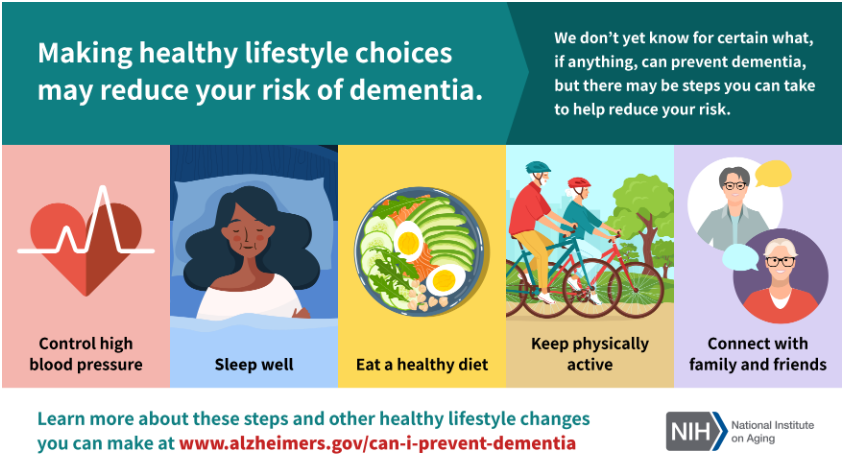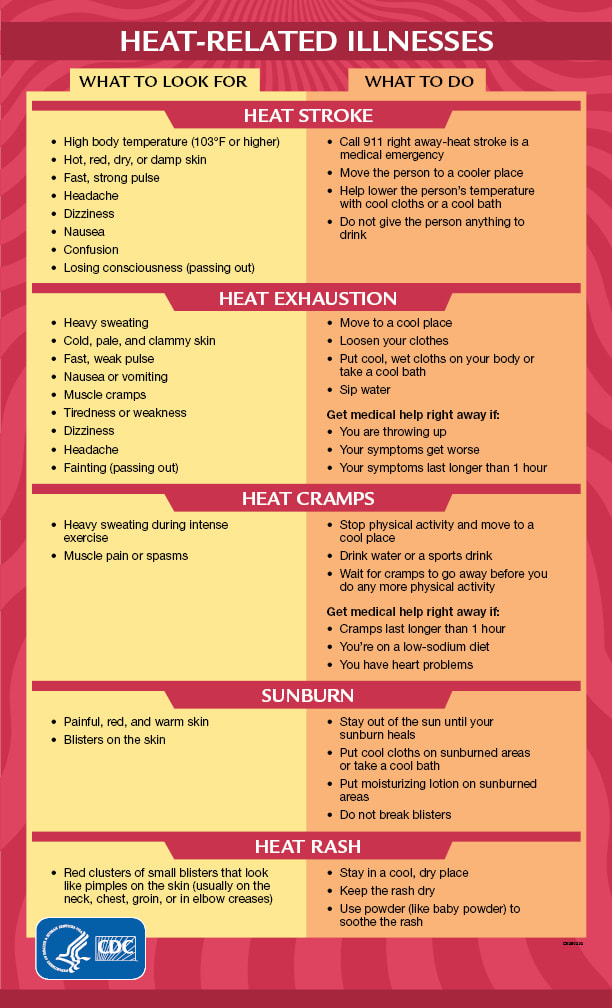|
There are many factors that influence the risk of dementia. Some factors are beyond our control such as genetics and environment, but there are some steps you can take to help lower your risk of developing dementia.
1. Control high blood pressure High blood pressure has harmful effects on the heart, blood vessels, and brain. These stress factors can increase the risk of stroke and vascular dementia. Treating high blood pressure with medication and healthy lifestyle changes, such as exercising and quitting smoking, may help reduce the risk of dementia. 2. Get plenty of sleep Sleeping well is important for your mind and body. Try to get seven to eight hours of sleep each night. Talk with a doctor if you are not getting enough sleep or if you think you may have a sleep disorder. 3. Maintain a healthy diet Aim for a mix of fruits and vegetables, whole grains, lean meats and seafood, unsaturated fats such as olive oil, low-fat or nonfat dairy products, and limit other fats and sugars. 4. Stay physically active Physical activity has many health benefits, such as helping to prevent obesity, heart disease, stroke, and high blood pressure. Aim for at least 150 minutes of moderate-intensity physical activity each week. 5. Stay connected with family and friends Connecting with people and engaging in social activities can prevent social isolation and loneliness, which are linked to higher risks for cognitive decline and Alzheimer’s disease. While it is impossible to completely eliminate all risk of developing dementia these tips can help lower your risk and improve your overall health. As the temperatures rise here in Spokane it’s important to remember that summer heat can be hazardous for anyone, but especially for our seniors. As we age, our bodies do not process the temperature changes as efficiently as they did when we were younger.
There are several warning signs to watch for when it comes to heat exhaustion:
While out and about in the summer heat these 3 tips will help keep you safe. 1. Stay Hydrated It is recommended a person should drink eight glasses of water a day just to stay hydrated. Drinking smaller amounts of water frequently is more effective than drinking a lot of water all at once. In addition to water, foods with high water content, such as Jell-O, fruit, or popsicles can help with your overall water intake. 2. Wear Appropriate Clothing Light loose-fitting clothing that breaths well is ideal for hot weather. Light colored clothing is a good choice as well. Also consider wearing a hat with flaps that shade the face, back of neck, and ears. Always wear sunglasses that offer protection from UV rays. 3. Stay Cool Avoid the mid-day sun when possible. Plan your outdoor activities for the morning or evening whenever possible when temperatures are lower. Going for a swim or even a cool shower can help keep your body temperature in the proper range. According to the CDC if you are experiencing any symptoms of heat exhaustion you should:
Get medical help right away if:
We all want to enjoy the bright sunny days of summer while staying safe. Follow these tips and watch for these signs of heat exhaustion to make the most of the season. |
AuthorTyice Strahl Categories
All
Archives
May 2023
|
- Home
-
Settings
- Assisted Living
- Home Care
- Independent Living
- Memory Care
- Skilled Nursing
- Adult Family Homes
-
All Communities
>
- Aspen Quality Care
- Avamere South Hill
- Brighton Court
- Brookdale Nine Mile
- Brookdale Park Place
- Cheney Assisted Living
- Cherrywood Assisted Living
- Colonial Court
- Cornerstone Court
- Evergreen Fountains
- Palouse Country
- Fairview Assisted Living
- Fairwinds
- Fairwood
- Fieldstone Memory Care
- Good Samaritan
- Maplewood Gardens
- Moran Vista
- North Point Village
- Orchard Crest
- Pine Ridge Memory Care
- Emilie Court
- Ridgeview Place
- Riverview Retirement
- Rockwood Retirement Community
- Rose Pointe Assisted Living
- Royal Park
- South Hill Village
- Sullivan Park Assisted Living
- Sunshine Health Facilities
- Touchmark Assisted Living
- Willow Grove
- Wind River
- Alderwood Manor
- Franklin Hills
- Manor Care
- North Central Care Center
- Providence St Joseph
- Regency at Northpointe
- Royal Park Health and Rehabilitation
- Spokane Veterans Home
- The Gardens on University
- Spokane Assisted Living Directory
- Locations
- Services
- About
- Senior Living Blog
- Contact



 RSS Feed
RSS Feed
